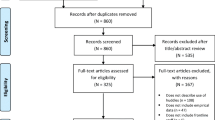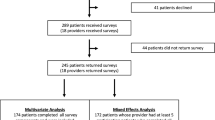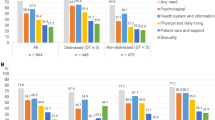Abstract
Purpose
Improving the coordination of care for people with lung cancer is a health priority. This study aimed to tailor an existing care coordination survey for a lung cancer population, investigate coordination experiences for patients who had received hospital-based treatment and identify any factors that may be associated with poor care coordination.
Methods
We conducted a cross-sectional survey of lung patients within two tertiary hospitals in Sydney, Australia. The Cancer Care Coordination Questionnaire for Patients (CCCQ-P) is a psychometrically valid and reliable survey originally developed for colorectal cancer. We pilot tested a survey adaptation with lung cancer patients, support group members and medical specialists (n = 49). A revised survey was mailed to eligible patients via their medical specialist.
Results
Fifty-three of 118 eligible participants (45%) completed the CCCQ-P; most had early-stage disease and were about 70 years old. Overall, participants reported positive experiences of care coordination (mean total score 78.1), with high scores on communication and navigation subscales. The most problematic areas related to administrative aspects of care coordination and communication and information provision. Two patient groups (those residing in regional and rural areas, or no experience with the health system prior to diagnosis) reported significantly lower scores on the navigation subscale.
Conclusions
This study found that lung cancer patients’ experience of care coordination was positive, but highlighted the need for strategies to assist patients living in rural areas, and those with no experience of the health care system. The CCCQ-P survey instrument can be used in future lung cancer studies.

Similar content being viewed by others
References
Australian Institute of Health and Welfare (2017) Cancer in Australia 2017. Cancer series no.101. Cat. no. CAN 100. AIHW, Canberra
Cancer Council Australia Lung Cancer Guidelines Working Party. Clinical practice guidelines for the treatment of lung cancer. Sydney: Cancer Council Australia. Version URL: http://wiki.cancer.org.au/australiawiki/index.php?oldid=136058. Accessed Dec 28 2016.
Sanders SL, Bantum EO, Owen JE, Thornton AA, Stanton AL (2010) Supportive care needs in patients with lung cancer. Psycho-Oncology 19(5):480–489
Sanson-Fisher R, Girgis A, Boyes A, Bonevski B, Burton L, Cook P (2000) The unmet supportive care needs of patients with cancer. Cancer 88(1):226–237
Krishnasamy M, Wilkie E, Haviland J (2001) Lung cancer health care needs assessment: patients’ and informal carers’ responses to a national mail questionnaire survey. Palliat Med 15(3):213–227. https://doi.org/10.1191/026921601678576202
Li J, Girgis A (2006) Supportive care needs: are patients with lung cancer a neglected population? Psycho-Oncology 15(6):509–516. https://doi.org/10.1002/pon.983
Breast Services Enhancement Program (2005) Learning from the past-informing the future: continuity and coordination of care—improving the ‘cancer journey’. Victorian Government Department of Human Services, Melbourne
King M, Jones L, Richardson A, Murad S, Irving A, Aslett H, Ramsay A, Coelho H, Andreou P, Tookman A, Mason C, Nazareth I (2008) The relationship between patients’ experiences of continuity of cancer care and health outcomes: a mixed methods study. Br J Cancer 98(3):529–536. https://doi.org/10.1038/sj.bjc.6604164
Institute of Medicine (2013) Delivering high-quality cancer care: charting a new course for a system in crisis. The National Academies Press, Washington, DC
Thomas R, Richardson A (2004) The NICE guidance on supportive and palliative care d implications for oncology teams. Clin Oncol 16:420–424. https://doi.org/10.1016/j.clon.2004.05.008
McDonald K, Sundaram V, Bravata D, Lewis R, Lin N, Kraft S et al (2007) Closing the quality gap: a critical analysis of quality improvement strategies. Vol 7. Rockville, Agency for Healthcare Research and Quality
Cancer Australia (2014) Cancer Australia Strategic Plan 2014–2019. Cancer Australia, Surry Hills, NSW
Cancer Institute NSW (2016) NSW Cancer Plan. Cancer Institute NSW, Sydney
Canada: CanIMPACT. CanIMPACT: Canadian team to improve community-based cancer care along the continuum. University of Toronto, Toronto, ON. 2013. http://canimpact.utoronto.ca/. Accessed 27 July 2017.
Smith C, Hough L, Cheung C-C, Millington-Sanders C, Sutton E, Ross JR, Thick M, Riley J (2012) Coordinate my care: a clinical service that coordinates care, giving patients choice and improving quality of life. BMJ Support Palliat Care 2(4):301–307
Daveson BA, Harding R, Shipman C, Mason BL, Epiphaniou E, Higginson IJ, Ellis-Smith C, Henson L, Munday D, Nanton V, Dale JR, Boyd K, Worth A, Barclay S, Donaldson A, Murray S (2014) The real-world problem of care coordination: a longitudinal qualitative study with patients living with advanced progressive illness and their unpaid caregivers. PLoS One 9(5):e95523. https://doi.org/10.1371/journal.pone.0095523
Birt L, Hall N, Emery J, Banks J, Mills K, Johnson M, Hamilton W, Walter FM (2014) Responding to symptoms suggestive of lung cancer: a qualitative interview study. BMJ Open Respir Res 1(1):e000067
Rankin NM, York S, Stone E, Barnes D, McGregor D, Lai M, Shaw T, Butow PN (2017) Pathways to lung cancer diagnosis: a qualitative study of patients and general practitioners about diagnostic and pretreatment intervals. Ann Am Thorac Soc 14(5):742–753. https://doi.org/10.1513/AnnalsATS.201610-817OC
Tod A, Redman J, McDonnell A, Borthwick D, White J (2015) Lung cancer treatment rates and the role of the lung cancer nurse specialist: a qualitative study. BMJ Open 5(12):e008587
Epiphaniou E, Shipman C, Harding R, Mason B, Murray SA, Higginson IK et al (2014) Coordination of end-of-life care for patients with lung cancer and those with advanced COPD: are there transferable lessons? A longitudinal qualitative study. Prim Care Respir J 23(1):46–51
Young JM, Butow PN, Walsh J, Durcinoska I, Dobbins TA, Rodwell L, Harrison JD, White K, Gilmore A, Hodge B, Hicks H, Smith S, O’Connor G, Byrne CM, Meagher AP, Jancewicz S, Sutherland A, Ctercteko G, Pathma-Nathan N, Curtin A, Townend D, Abraham NS, Longfield G, Rangiah D, Young CJ, Eyers A, Lee P, Fisher D, Solomon MJ (2013) Multicenter randomized trial of centralized nurse-led telephone-based care coordination to improve outcomes after surgical resection for colorectal cancer: the CONNECT intervention. J Clin Oncol Off J Am Soc Clin Oncol 31(28):3585–3591. https://doi.org/10.1200/JCO.2012.48.1036.
Young JM, Walsh J, Butow PN, Solomon MJ, Shaw J (2011) Measuring cancer care coordination: development and validation of a questionnaire for patients. BMC Cancer 11:298. https://doi.org/10.1186/1471-2407-11-298
Durcinoska I, Young JM, Solomon MJ (2017) Patterns and predictors of colorectal cancer care coordination: a population-based survey of Australian patients. Cancer 123(2):319–326. https://doi.org/10.1002/cncr.30326.
Hawley ST, Janz NK, Lillie SE, Friese CR, Griggs JJ, Graff JJ, Hamilton AS, Jain S, Katz SJ (2010) Perceptions of care coordination in a population-based sample of diverse breast cancer patients. Patient Educ Couns 81 Suppl:S34–S40. https://doi.org/10.1016/j.pec.2010.08.009
Beesley VL, Janda M, Burmeister EA, Goldstein D, Gooden H, Merrett ND, O’Connell DL, Wyld DK, Chan RJ, Young JM, Neale RE (2017) Association between pancreatic cancer patients’ perception of their care coordination and patient-reported and survival outcomes. Palliat Support Care:1–10. https://doi.org/10.1017/s1478951517000608
Ayanian JZ, Zaslavsky AM, Guadagnoli E, Fuchs CS, Yost KJ, Creech CM, Cress RD, O’Connor LC, West DW, Wright WE (2005) Patients’ perceptions of quality of care for colorectal cancer by race, ethnicity, and language. J Clin Oncol Off J Am Soc Clin Oncol 23(27):6576–6586. https://doi.org/10.1200/JCO.2005.06.102.
Cancer Australia: Principles for best practice management of lung cancer in Australia. Surry Hills, NSW: Cancer Australia 2013.
Rankin NM, Collett GK, Brown CM, Shaw TJ, White KM, Beale PJ, Trevena LJ, Anderiesz C, Barnes DJ (2017) Implementation of a lung cancer multidisciplinary team standardised template for reporting to general practitioners: a mixed-method study. BMJ Open 7(12):e018629. https://doi.org/10.1136/bmjopen-2017-018629
Australian Institute of Health and Welfare. Rural, regional and remote health: a guide to remoteness classifications. In. Edited by AIHW. Canberra; 2004.
Government of New South Wales. Registry of Births, Death and Marriages (RBDM). NSW Government, Sydney. 2016. http://www.bdm.nsw.gov.au/. 2016.
StataCorp (2013) Stata Statistical Software: Release 13. StataCorp LP, College Station
Rankin N, McGregor D, Stone E, Butow P, Young JM, White K, Shaw T (2016) Evidence-practice gaps in lung cancer: a scoping review. Eur J Cancer Care 27:e12588. https://doi.org/10.1111/ecc.12588
Institute of Medicine Committee on Quality of Health Care in America (2001) Crossing the quality chasm: a new health system for the 21st century. National Academies Press (US) Copyright 2001 by the National Academy of Sciences. All rights reserved., Washington (DC)
Hendren S, Griggs JJ, Epstein R, Humiston S, Jean-Pierre P, Winters P, Sanders M, Loader S, Fiscella K (2012) Randomized controlled trial of patient navigation for newly diagnosed cancer patients: effects on quality of life. Cancer Epidemiol Biomark Prev 21(10):1682–1690. https://doi.org/10.1158/1055-9965.epi-12-0537
Meade CD, Wells KJ, Arevalo M, Calcano ER, Rivera M, Sarmiento Y, Freeman HP, Roetzheim RG (2014) Lay navigator model for impacting Cancer health disparities. J Cancer Educ 29(3):449–457. https://doi.org/10.1007/s13187-014-0640-z.
Chumbler NR, Kobb R, Harris L, Richardson LC, Darkins A, Sberna M, Dixit N, Ryan P, Donaldson M, Kreps GL (2007) Healthcare utilization among veterans undergoing chemotherapy: the impact of a cancer care coordination/home-telehealth program. J Ambul Care Manage 30(4):308–317
Hunnibell LS, Rose MG, Connery DM, Grens CE, Hampel JM, Rosa M, Vogel DC (2012) Using nurse navigation to improve timeliness of lung cancer care at a veterans hospital. Clin J Oncol Nurs 16(1):29–36. https://doi.org/10.1188/12.cjon.29-36
Acknowledgments
We are very grateful to all project participants, particularly the patients who took part in the survey and members of the Lung Foundation Australia lung cancer support group. We wish to thank clinicians in the lung cancer multidisciplinary teams at the study hospitals who reviewed the survey instrument and contacted patients to participate. We acknowledge the input of the Lung Cancer Demonstration Project (LCDP) NSW Collaboration team members, including three consumer representatives. We also thank Barbara Daveson and David Salvestrin from Cancer Australia for supporting the NSW Collaboration of the LCDP.
Funding statement and independence of the researchers
This work was supported by Cancer Australia as part of the NSW Collaboration of the Lung Cancer Demonstration Project (LCDP). The LCDP is an initiative of Cancer Australia, funded by the Australian Government. The study funder, Cancer Australia, had no role in the study design; the collection, analysis, and interpretation of data; or in the decision to submit the article for publication.
Author information
Authors and Affiliations
Contributions
This study was proposed by JY. GKC wrote the first draft of the manuscript and significant contributions were made by ID and NMR. Project management was overseen by NMR. GKC undertook all project coordination tasks, including ethics and governance approvals and data collection. Data analysis was undertaken by ID with advice from JY. DJB and PB are clinical leaders at the participating sites. All authors contributed to manuscript drafts and approved the final draft of the manuscript for submission.
Ethics declarations
Competing interests
The authors declare that they have no competing interests.
Ethics
Ethics approval for this project was obtained from the Sydney Local Health District Human Research Ethics Committee (LNR/15/RPAH/508) and site-specific local governance approvals were granted prior to project commencement.
Rights and permissions
About this article
Cite this article
Collett, G.K., Durcinoska, I., Rankin, N.M. et al. Patients’ experience of lung cancer care coordination: a quantitative exploration. Support Care Cancer 27, 485–493 (2019). https://doi.org/10.1007/s00520-018-4338-3
Received:
Accepted:
Published:
Issue Date:
DOI: https://doi.org/10.1007/s00520-018-4338-3




